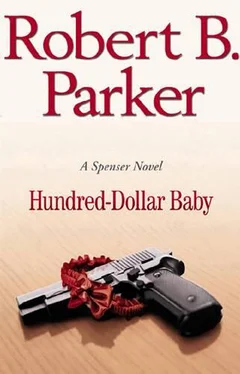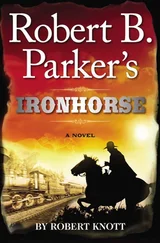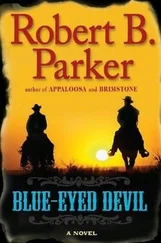"You do that?"
"Yes," April said. "Men come here knowing they'll have an affectionate, sexy time with attractive, intelligent, and well-spoken women."
"AIDS?" I said.
"That risk exists in any sexual encounter," April said, "unless it's a long-term monogamous one. Short of that, we take every precaution. Our girls are regularly tested. Our clients are from a level of society that is less likely to encounter AIDS."
"And the personal services?" I said.
"Well, aren't you nosy," she said.
"Part of my profession," I said. "I can withdraw the question."
"Sometimes, special circumstances."
"I think I won't explore the special circumstances," I said.
She shrugged.
"No big deal," she said. "Sometimes a client wants to fuck the boss."
"The house mother, so to speak."
April stared at me.
"Are you being shrinky with me?" she said.
"Just a thought," I said.
"Well, I know you're with Susan and all, but I don't buy any of that."
"I'm not selling it," I said.
"Sorry," April said. "I've just… I tried it for a while… Most of the shrinks I talked with were crazier than I was."
We were quiet. Tedy picked up a chess piece and moved it. Hawk studied the move. Their concentration was palpable.
"Do you play chess?" April said.
"No," I said.
"Do you know how?"
"No."
"I don't either," she said.
Hawk picked up his chess piece and moved it. Tedy nodded slowly as if he approved.
"Could you come to my office with me for a moment?" April said.
"Sure."
We left the room and walked past the concierge and down the hall to the office. The office staff was busy at their computers.
"Tell me a little more about Tedy Sapp," she said.
"What more?" I said.
"He seems, sort of, different."
"He is different," I said. "So is Hawk. So am I. We're all different. It's why we do what we do."
"But… what's going on with the hair?"
"Too blond?" I said.
"And artificial. He looks like some sort of ridiculous wrestler or bodybuilder or something."
"Tedy's gay," I said. "He fought it for a long time. The bright hair is sort of a statement: I'm not trying to pass."
"But can he really do what he's supposed to?"
I was quiet for a moment. There were a lot of things to say. But I didn't say any of them. I just answered the question.
"Better than almost anyone," I said.
I was at my desk, with my feet up, on the phone with Patricia Utley, who was at home in New York. Pearl was spending quality time with me, in my office, on her couch, lying upside down with her head hanging and her tongue lolling. She seemed boneless lying there, and nerveless, as if time and stress were of no consequence and eternity were a plaything.
"When you brought her to me she was a terrified child," Patricia Utley was saying. "I cleaned her up and began to train her. I didn't send her out for a year."
"Orphans of the Storm," I said.
"Well, not entirely, I am a businesswoman. But my childhood was somewhat turbulent, and I was sympathetic."
"And you're maybe softer than you pretend," I said.
"You would understand that," she said. "She was nearly grown and making good progress when she ran off with that idiot Rambeaux."
"Who was not softer than he pretended."
"Hardly," Patricia Utley said.
"Give all for love," I said.
"Give something for love, perhaps. Not everything," Patricia Utley said. "By the time you got her back to me I had to start nearly all over with her."
"She'd had a bad time," I said.
"Many people do," Patricia Utley said. "Especially in the whore business. We try to be the exception."
"We all try," I said. "You succeeded."
"Is that your imitation of Humphrey Bogart?"
"How good is it if you have to ask?" I said.
"Think about it," Patricia Utley said. "Eventually, we got April back on her feet and she became one of my most successful girls."
"So what about this business you set her up in?" I said.
"It's not a wonderful business. But it gives her a chance to run her own show and make a decent living. I did it mainly for April."
"You take back a royalty?"
"Yes. Ten percent."
"Of the gross?" I said.
"Of the net," she said.
"You are doing this," I said, "for April."
"Yes, my take is little more than seven thousand five hundred dollars a year."
"So the business is worth about seventy-five thousand dollars to April."
"Roughly," Patricia Utley said. "There is a lot of overhead."
"The house, the furnishings, the working girls, the office staff," I said.
"And the bar and dining room, and bribes to law enforcement, payment to Mr. Marcus, cleaning services, quite a large laundry bill, physical exams for the girls, clothing allowances."
"Pay the girls' salaries?" I said.
"The whores? They get an advance against earnings. If, in a relatively short time, they don't earn out, they are outplaced."
"How's it compare with your operation in New York," I said.
"For profit?"
"Yes."
"Pocket change," she said. "There's too little volume, too much overhead. I may never get my investment back."
"Has it got an upside down the road?"
"No," Patricia Utley said. "I doubt it. I have not hovered over this project, but it seems that it has as large a share of the market as it is likely to get."
Pearl got off the couch suddenly and walked swiftly around my office until she found a dirty and badly tattered stuffed toy animal of indeterminate species. She picked it up and chewed on it so it squeaked and brought it to me.
"What on earth is that noise?" Patricia Utley said.
"Squeaky toy," I said.
Pearl squeaked it at me some more until I took it and tossed it across the room.
"Have you ever worried that maybe you are alone too much," Patricia Utley said.
"Susan and I have a dog," I said, "and she's come to work today with Daddy."
"My God," Patricia Utley said.
Pearl picked up her squeaky toy and shook it and looked at me, and made a decision, and jumped up on the couch with her squeaky toy and lay down with it underneath her.
"Are you going to tell me why you called," Patricia Utley said.
"Someone's trying to shake April down."
"And she came to you."
"Yes."
"Do you know who it is?"
"Not yet," I said.
"Do you have any help?" she said.
"Two men."
"So there will be some cost," she said.
"Some."
"Has April paid you?"
"No."
"She probably can't really afford to," Patricia Utley said. "When it's done, if you'll submit me a bill, perhaps I will pay you."
"Let's revisit the question when it's done," I said.
"Do you need any other help?" Patricia Utley said. "Stephen is gone. But I have resources."
"I'm fine," I said. "Sorry to hear about Stephen."
"We were together a long time," she said.
"Not long enough," I said.
"It's never long enough," she said. "Is it."
It was an ironclad rule at Susan's house that Pearl did not eat supper before five p.m.
"If you give in to her," Susan always said, "we'll be feeding her supper at noon."
This was perfectly true, and the rule made a great deal of sense. So after Pearl and I walked the four blocks back to my place in the late afternoon, I ignored her insistent stare unshakably, and didn't feed her until 4:11.
Pearl was an efficient and focused eater. By 4:13 her dish was empty and she was topping it off with a long lap at her water dish. Then, having fulfilled her responsibilities for the day, she got up on the couch and curled up and looked at me. Susan was at a conference in Albany and wouldn't be back until tomorrow. I was in for the night. I went to my kitchen counter and made myself a drink and brought it to the couch and sat down beside Pearl. It was a tall drink, scotch with soda and a lot of ice. It had a nice, clean look to it. I drank some. It tasted like it looked. I patted Pearl.
Читать дальше












